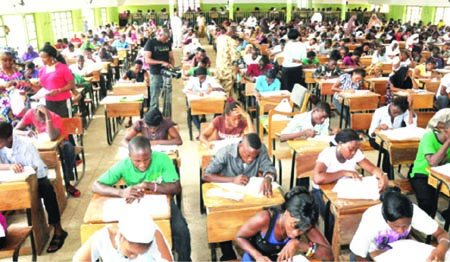It has been observed, all along, that gaining admission into the Nigerian universities is as easy as a camel passing through the hole of a needle. It should rather have been made as difficult as water passing through a sloppy drainage. What a paradox!
Over the years, it has been frowned at that Nigerians send their wards to school abroad and undesirability of that practice stem from the fact that choosing schools abroad over the ones at home is indirect way of telling the world that either there is no university in Nigeria or the ones here have no qualities to guarantee the prerequisites for trusted knowledge. Another negative effect of sending wards to school abroad is exporting the wealth of the nation through overseas studies to thereby mounting pressure on nation’s forex reserve just to help develop economies of other nations. In summary, it smacks of confidence loss in Nigerian knowledge industry that, despite the presence of many universities here, many Nigerians send their children abroad to study.
But why would a Nigerian choose a university abroad over the ones in Nigeria? Many factors are responsible. Among these factors is faulty system, which not only makes admission into Nigerian universities a tight struggle but also, more sadly, renders products that have opportunity of scaling through the rigorous admission process unemployable in most cases. In putting behind these associated problems, people in positions of authorities must speak on the system they put in place with which they handle the knowledge industry in the country.
It is only in Nigeria that enrollment into primary school is thug-of-war. It is only in this country that it is big trouble to get a child into school for secondary education especially when it comes to the unity schools. After getting through with all the struggles, which the children are unnecessarily and nonchalantly subjected to, entering into the university is another leg of the struggles, yet the university stage defines and determines what the children become in life. In desperation of not wanting to be let down, therefore, most parents go through many things including examination malpractices, man-know-man and instinct to bribe university admission officers so their children can gain admission. If some parents can afford the costs of achieving all these irregular means, much illicit as they are, how many more Nigerian parents can?
There had been cases of students who passed JAMB far above cut-off marks and who went ahead to score far above cut-off marks at post-UTME (before it was scrapped), who did not have admission but students who scored less got admission. Many prospective candidates have remained at home for so many years, not because they are not brilliant but, because of this. The excuse given on the part authorities has always been that the “number of admission seekers is more than available slots.” What manner of system is in place which selectively educate its citizens and would go to the extent of such discrepancy to disenfranchise a lot of people that ordinarily should access education without having anybody to back him with letter? Those in charge of education system in Nigeria must tell the world. It is imperative they do.
Without sounding unreasonable, let’s say, give admission to all qualified JAMBites and if there are no lecture rooms, let them receive lectures in open space until there will be money for the universities to provide facilities to cover them. There should be no excuse for denial of any Nigerian child access to university education once he makes it to cut-off mark in his JAMB examination, if that is what he has been qualified to have. Failing to do this, one would be right to say that those in charge of education in Nigeria are themselves responsible for loss of interest of Nigerians in Nigerian universities thereby killing the school system in the country. How then would the wealth and qualities, which should be earned from Nigerian universities by the Nigerian economy, not be exported to other lands?
The issue with this is that, those who send their wards abroad are the privileged; what about the less privileged Nigerians who cannot afford it and whose children thus go into all sorts of odd jobs like street hawking, artisanship/hooliganism and other things that children do at unripe times, which cut short their dreams of becoming great in life? And this being because even the alternative, which offer less strenuous admission, are not affordable to any parent of the less privileged. Where does a widow selling roasted plantain at a Lagos bus stop have N500,000 per annum to pay her child’s school fee in a private university? This is one of the issue with selective educational system made possible for the bottlenecks in Nigerian universities admission system.
The DEFENDER advises that the system of education in Nigeria must not only be made easy but also be encouraging until every Nigerian child and even the old have become completely educated. It should be made easy and encouraging to the point of even attracting students from other countries to study courses like sciences and technology in Nigeria. The only course people from outside come to study in Nigerian universities (particularly University of Ibadan) is Yoruba Language and Culture. Nigerian national educational sector can be better than that to make Nigerian universities be part of knowledge capacity that defines global industrial growth and economic development.
Professor Is-haq Oloyede, immediate past Vice Chancellor of University of Ilorin’s coming as Registrar and Chief Executive of the Joint Admissions and Matriculations Board (JAMB) appears to be providing solution to these many problems, but to what extent? What Oloyede has done is commendable to say that any student that meets up cut-off mark must be admitted and that individual university should be allowed to decide its own cut-off mark. To be remembered for bringing permanent solution to university admission bottlenecks in Nigeria, however, Professor Oloyede as JAMB boss at this time should try and correct the system and make it unchangeable to any person that comes on board in future. This he can achieve by working hand-in-hand with the Minister of Education, Alhaji Adamu Adamu as well as National Population Commission boss and particularly the department of statistics) in ensuring that any graduate that is produced by any Nigerian university is golden and employable anywhere in the world. This media believes that knowledge building should be based on the industrial needs of Nigeria.
We at The DEFENDER are saying that, because it is a trust by God to educate the child, the government and stakeholders in this sector should come together and provide a workable system that will move away from the complex to the flexible and practicable nature of seeing every student having access to, not only qualitative but also, quantitative education. And by doing so, a child or his parent does not need to know or possess anybody’s recommendation letter or to bribe any admission officer before gaining admission into any university of choice in Nigeria. This is the Nigerian education sector that we have clamoured for at this time and that exactly is what we want the government to do.




